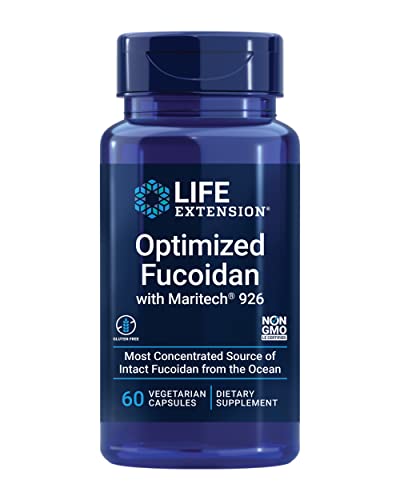Fucoidan for Pain Relief? What the Research Says
Quick Summary: Research in animals suggests that reducing neutrophils (a type of immune cell) can help with certain types of pain. Fucoidan, a substance found in seaweed, was one of the methods used to reduce these cells in the studies.
Can Fucoidan Help With Pain?
This research looked at many animal studies to see if getting rid of neutrophils could help with pain. The studies found that reducing neutrophils did help with pain caused by inflammation, joint problems, nerve damage, and issues in the organs. Fucoidan was one of the substances used to reduce neutrophils in these studies.
What The Research Found
- Pain Relief: Reducing neutrophils led to a significant decrease in pain in several types of pain.
- Fucoidan's Role: Fucoidan was one of the methods used to reduce neutrophils, and it showed promising results.
- Pain Types: The pain relief was most effective for pain related to inflammation, joints, nerves, and organs.
- Not All Pain: It didn't seem to help much with muscle pain or pain after surgery in these studies.
Study Details
- Who was studied: Mice and rats were used in the studies.
- How long: The studies varied in length, but the analysis looked at the results of many different studies.
- What they took: The animals received different treatments to reduce neutrophils, including fucoidan. The exact dose of fucoidan wasn't specified in the summary.
What This Means For You
This research is promising, but it's important to understand that it was done on animals.
- Fucoidan is not a proven pain treatment for humans.
- More research is needed: Scientists need to do more studies to see if these findings apply to people.
- Talk to your doctor: Always talk to your doctor before trying any new supplements or treatments for pain.
Study Limitations
- Animal Studies Only: The research was only done on animals, so we don't know if the same results would happen in humans.
- Different Methods: The studies used different methods to reduce neutrophils, which could affect the results.
- More Research Needed: We need more research to understand how fucoidan works and if it's safe and effective for people with pain.
Technical Analysis Details
Key Findings
This meta-analysis of 49 preclinical animal studies found that preemptive neutrophil depletion significantly reduced pain in inflammatory, joint, neuropathic, and visceral pain models (medium-large effect sizes, p < 0.05), but not in muscle or postoperative pain. Neutrophil depletion had the strongest effect on mechanical hyperalgesia, followed by nociceptive behaviors and mechanical allodynia, with minimal impact on thermal hyperalgesia. Fucoidan was identified as one of several effective neutrophil-depleting agents (alongside anti-Ly6G antibody, CXCR1/2 inhibitors, etanercept, and vinblastine), showing greater pain reduction than antineutrophil serum or anti-Gr-1 antibody.
Study Design
The study was a systematic review and meta-analysis (PROSPERO: CRD42022364004) of original animal studies. Literature was searched via PubMed (cutoff: January 19, 2023), yielding 49 eligible articles. A random-effects model was used for meta-analysis, with risk of bias assessed via SYRCLE’s tool. No human participants were involved; all data derived from rodent models (mice/rats), though exact animal sample sizes per study were not aggregated in the summary.
Dosage & Administration
The meta-analysis did not specify doses or administration protocols for fucoidan or other depletion agents. It only categorized depletion methods by agent type (e.g., fucoidan, antibodies, pharmacological inhibitors), noting efficacy differences between strategies without quantitative dosing details.
Results & Efficacy
Pooled analysis showed neutrophil depletion significantly reduced pain across all studies (effect size not numerically specified but described as "medium-large" for responsive pain types). Subgroup analysis revealed:
- Inflammatory/joint/neuropathic/visceral pain: Significant alleviation (p < 0.05).
- Muscle/postoperative pain: No significant effect (p > 0.05).
Fucoidan-based depletion demonstrated superior efficacy compared to antineutrophil serum or anti-Gr-1 antibody, though exact effect sizes or p-values for fucoidan alone were not provided. Mechanical hyperalgesia showed the strongest response to depletion.
Limitations
The analysis was limited to animal studies, with no human data. Heterogeneity in pain models, depletion methods, and outcome measures introduced variability. SYRCLE’s tool indicated potential bias in study design (e.g., lack of randomization/blinding in primary studies). Dosing regimens, timing of depletion, and fucoidan-specific mechanisms were not standardized or detailed. Future research must clarify why certain depletion agents (like fucoidan) outperformed others and validate findings in human-relevant models.
Clinical Relevance
This study does not support direct use of fucoidan for pain management in humans. It identifies neutrophil depletion as a potential therapeutic target for specific pain types (e.g., inflammatory or neuropathic), with fucoidan serving as an experimental tool in preclinical research. Supplement users should note that fucoidan’s role here is mechanistic—not clinical—and human efficacy, safety, or dosing remains unestablished. Self-administration for pain relief is not advised based on this animal-data-only analysis.
Original Study Reference
The role of neutrophils in pain: systematic review and meta-analysis of animal studies.
Source: PubMed
Published: 2025
📄 Read Full Study (PMID: 39450928)




